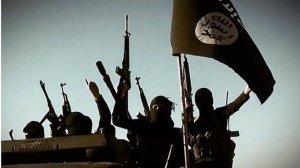
As foreign powers have worked to assert their respective agendas for the Middle East, blinded by their desire to see manifested their will onto the region, terror radicals have used the ever growing chatter and confusion to dig their heels and expand their reach further out across the Islamic world.
Not content to have thrown the MENA region – Middle East and North Africa – out of its axis, playing havoc with global security, Daash has set its eyes on Yemen, a country already in the thrust of a terror insurgency movement.
The most populous and unruly country of the Arabian Peninsula, Yemen stands very much a nation interrupted, ravaged by political instability and plagued by social unrest, an institutional shell void of cohesion. And yet, beyond the chaos, rampant corruption and abject poverty, this one sovereign state of southern Arabia remains a geo-strategic jewel of crucial importance, a prize for whoever and whatever will manage to wield enough power to bring it to yield.
Very much the ugly duckling amid its uber rich oil and gas producing neighbours, Yemen makes up in geography alone what it lags in natural resources. For all its woes and over-lapping crises, Yemen stands the most important naval straits in the world. Over-looking Bab-el-Mandeb, the world’s oil route, Yemen also sat at an important geographic crossroad in between Africa and Asia, offering an opening and a vantage point onto continents no other country in the world offer.
Should Yemen falter completely to terror, radicals would find themselves in control of one the most lucrative and primordial world’s commercial route. And since there could never be political stability in a context of economic uncertainty, it would be fair to say that much of the world’ future depends on Yemen’s ability to ward off radicals. And yet, the country has been left to fend off for itself.
A sitting duck
While Yemen has been somewhat capable so far to oppose the threat Al Qaeda represents to its national security, experts, among whom Aden-based Omar Othman Shaibani, a former consultant for President Ali Abdullah Saleh on radical movements, warned that before the momentous military threat Daash has grown into the impoverished nation simply cannot hope to hold its own.
“Even though Yemen has been able so far to keep Al Qaeda militants at arm length, not without it is important to note some great difficulty and foreign military assistance, it is likely Sana’a government will crumble should Daash chose to unleash its legions on Yemen,” said Shaibani.
To which he added, “Fighting a guerrilla group is one thing … but facing a veritable army is another. Bearing in mind the level of disunity within the military and the security apparatus due to political enmities, Yemen will offer little resistance to Al Baghdadis men [Abu Bakr Al Baghdadi, the self-proclaimed leader of Daash].”
Still reeling from the fallouts of 2011 uprising, Yemen only exists through a complicated patchwork of shaky political and tribal alliances.
Stuck in institutional limbo, Yemen’s inability to reinvent itself on the wake of former President Saleh’s departure from power could prove more dangerous than anyone could ever have predicted, especially now that sectarian tensions have come to complicate an already impossible situation.
Broken and fractured, Yemen no longer resembles the vibrant nation it was once, it is now a sitting duck at the mercy of the black flag army … and no one is paying attention.
Writing on the wall
If international stakeholders expressed concerned in 2011 over the possibility that Al Qaeda would exploit Yemen’s power vacuum to hold international trade ransom by targeting Bab-el-Mandeb, a coup which would have a dramatic domino effect onto world economy and markets, Al Baghdadi’s declaration Yemen is next on his to-do list should have the international community ringing the alarm bell … and yet Yemen has been left to huff and puff as it stumbles along an ever elusive recovery road.
Earlier this November, Al Baghdadi, the infamous black caliph, called in an audio recording published on militants’ social media feeds, “We announce to you the expansion of the Islamic State to new countries, to the countries of the Haramayn, Yemen, Egypt, Libya, Algeria … Oh soldiers of the Islamic State … erupt volcanoes of jihad everywhere. Light the earth with fire against all dictators.”
He went on saying, “Oh soldiers of Yemen … Be harsh against the Houthis [Shia faction organized under the leadership of Abdel-Malek Al Houthi]; they are infidels and apostates. Fight them and win against them.”
If at this particular juncture in time Al Qaeda Yemen and Daash have yet to strike an alliance and overcome some of the ideological differences which have preventing them so far to pull their resources together, a rapprochement in between the two terror groups seems more a matter of when then if.
How long can we truly expect misconstrued wannabe Jihadists to remain divided when they strive to achieve the same goals, however different their envisioned methods?
As noted by Shaibani, “Do we really want to wait around for Daash to set up shop in Yemen? Or worse strike an alliance with Al Qaeda? However one looks at it, the exportation of Daash’s methodology to Yemen will be disastrous to not just the country but the greater region. It is high-time we open our eyes.”
With Yemen locked in an internal tug of war as warring political and tribal factions battle for control, officials might want to take a step back to assess what real dangers are lurking beyond their personal ambitions to understand that they stand to lose everything to terror.
Catherine Shakdam is the Associate Director of the Beirut Center for Middle Eastern Studies and a political analyst specializing in radical movements, exclusively for the online magazine “New Eastern Outlook”.
